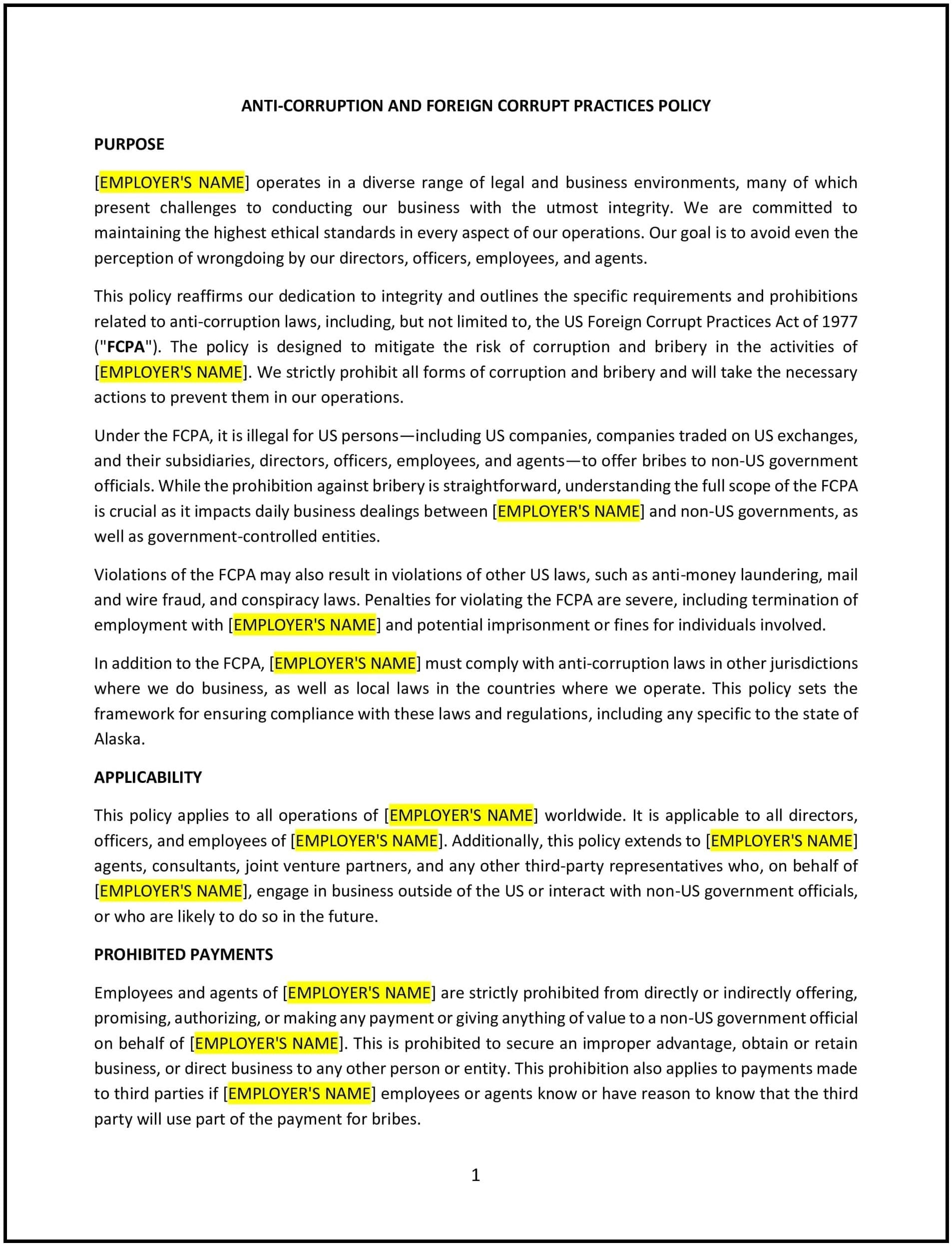Anti-corruption and foreign corrupt practices policy (Alaska): Free template
Got contracts to review? While you're here for policies, let Cobrief make contract review effortless—start your free review now.

Customize this template for free
Anti-corruption and foreign corrupt practices policy (Alaska)
In Alaska, an anti-corruption and foreign corrupt practices policy is crucial for maintaining business integrity and compliance with both state and federal regulations. This policy helps prevent bribery and corruption within your organization by outlining the company’s commitment to ethical conduct in its operations. By enforcing this policy, businesses in Alaska can ensure they meet compliance requirements while safeguarding their reputation and operations.
Given the complexity of Alaska's economy, particularly in industries like oil, gas, and mining, this policy is particularly relevant. Companies operating in these sectors often deal with government contracts, foreign transactions, and international stakeholders, which increase the risk of corruption. Therefore, having a clear and enforceable policy in place is critical for mitigating these risks and ensuring lawful and ethical business practices.
How to use this anti-corruption and foreign corrupt practices policy (Alaska)
- Define the scope: Clearly specify the areas and activities covered under the anti-corruption policy, such as bribery, kickbacks, and improper payments to public officials, particularly in industries that may be subject to international scrutiny.
- Set clear expectations: Establish a zero-tolerance stance towards corruption. Employees, contractors, and business partners should understand that any form of bribery or corrupt activity is strictly prohibited.
- Identify risks: Identify areas where the business is most vulnerable to corruption. This can include international operations, dealings with government officials, or sectors known for high-risk corruption activities, such as the oil and gas industry.
- Promote training and awareness: Ensure that all employees are trained on the policy and its importance. This can be achieved through regular training sessions, workshops, or informational materials that explain the policy's objectives and provide examples of prohibited conduct.
- Monitor compliance: Implement procedures for monitoring compliance with the policy. This includes regular audits, whistleblower mechanisms, and periodic reviews to assess the effectiveness of anti-corruption measures and identify areas for improvement.
Benefits of using an anti-corruption and foreign corrupt practices policy (Alaska)
A well-implemented anti-corruption policy can significantly benefit a company in Alaska by promoting ethical business practices and protecting it from legal and financial risks. Here's how it helps:
- Ensures compliance: By clearly outlining anti-corruption standards, businesses ensure compliance with both U.S. federal laws (such as the Foreign Corrupt Practices Act) and Alaska state regulations.
- Mitigates risks: Reduces the risk of corrupt practices, such as bribery, which could result in legal penalties, fines, and reputational damage.
- Enhances transparency: Promotes transparency in business dealings, particularly with public officials, government agencies, and foreign partners, fostering trust and integrity.
- Protects reputation: Helps maintain the company’s public image by ensuring that its business practices are above reproach. A strong anti-corruption policy signals to stakeholders that the company is committed to ethical operations.
- Improves business relationships: Ethical business practices foster stronger relationships with clients, suppliers, and government agencies, leading to better long-term partnerships.
Tips for using an anti-corruption and foreign corrupt practices policy (Alaska)
- Be clear and specific: The policy should define exactly what constitutes corruption, including bribes, kickbacks, and facilitation payments, and clarify how to handle offers of gifts or hospitality.
- Tailor to your industry: Customize the policy to address specific risks that apply to your business sector, such as government contracts in oil, mining, or tourism in Alaska.
- Establish reporting channels: Create anonymous reporting mechanisms (e.g., hotlines or online portals) where employees and third parties can report suspicious activities without fear of retaliation.
- Conduct periodic audits: Regular audits and risk assessments will help ensure that anti-corruption measures are being followed and that the policy remains relevant to current business practices.
- Enforce penalties: Clearly state the consequences for violating the policy, including disciplinary actions, legal penalties, and possible termination of employment or business contracts.